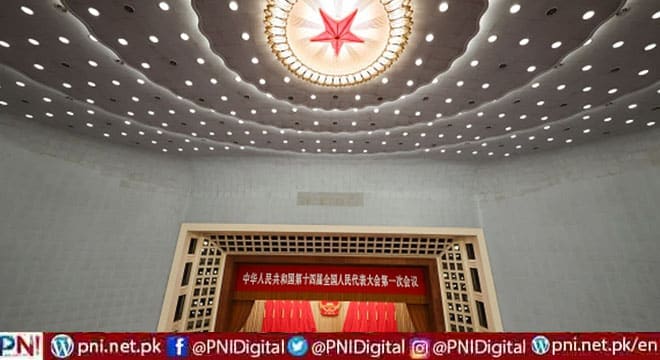Beijing, March 8 (AFP/APP): China will conduct a sweeping revamp of its science ministry and tech capabilities, pouring more resources into manufacturing and research as Beijing pushes for self-reliance in the face of foreign attempts at “containment and suppression”.
A broad restructuring document announced by China’s cabinet on Tuesday and set to be approved by the country’s parliament this week will refocus the Ministry of Science and Technology’s resources on coordinating scientific and technological breakthroughs.
Beijing will “optimise its management of the whole chain of science and technology innovation”, the document said, as well as set up a national data administration responsible for overseeing the digital economy.
China faced “a severe situation of international scientific and technological competition alongside external containment and suppression”, said Xiao Jie, a member of China’s State Council, as he introduced the plan at a meeting of the national parliament on Tuesday.
Beijing must “better coordinate scientific and technological capabilities to overcome difficulties in key core technologies”, while also accelerating “high-level scientific and technological self-reliance”, Xiao said, according to an official readout.
The rubber-stamp parliament is expected to approve the plan at its annual national meeting — known as the “lianghui” or “Two Sessions” — which wraps up on Monday.
The plan will slash staffing at the country’s central state institutions by five percent, with the freed-up headcount reallocated toward “key areas and important work”.
It will also replace China’s existing banking and insurance regulator with a new body incorporating some functions from its central bank and securities watchdog, strengthening oversight over the financial sector, already subject to a sweeping crackdown.
– Self-reliance –
President Xi Jinping vowed earlier this month to boost the country’s manufacturing capacity, telling Two Sessions delegates “we must rely on ourselves”.
Faced with an increasingly hostile international environment and lagging growth at home, Beijing is also grappling with a shift by global corporations away from Chinese factories to manufacturers in countries such as India and Vietnam.
Xi told Two Sessions delegates on Sunday that China must develop high-quality manufacturing that is “innovative, coordinated, green, open and shared”.
This year’s parliamentary meeting follows a key Communist Party conclave last year that secured Xi another five years as head of the party and the military. The Chinese leader is expected to be reappointed as president this week.
Changhao Wei, a fellow at Yale Law School’s Paul Tsai China Center, told AFP that Tuesday’s restructuring followed “practically an unwritten rule that this must happen at the start of each government’s five-year term”.
An even broader plan is expected after the Two Sessions close next week, with Wei adding that “it’s certainly possible, and even likely, that the Party (and Xi personally) would assert more control as part of this round of restructuring”.
Follow the PNI Facebook page for the latest news and updates.









